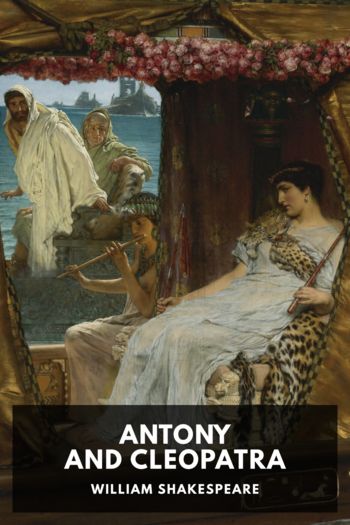Antony and Cleopatra William Shakespeare (easy readers TXT) 📖

- Author: William Shakespeare
Book online «Antony and Cleopatra William Shakespeare (easy readers TXT) 📖». Author William Shakespeare
Fly off our loves again! Lepidus Happily, amen! Antony
I did not think to draw my sword ’gainst Pompey;
For he hath laid strange courtesies and great
Of late upon me: I must thank him only,
Lest my remembrance suffer ill report;
At heel of that, defy him.
Time calls upon’s:
Of us must Pompey presently be sought,
Or else he seeks out us.
Great and increasing: but by sea
He is an absolute master.
So is the fame.
Would we had spoke together! Haste we for it:
Yet, ere we put ourselves in arms, dispatch we
The business we have talk’d of.
With most gladness;
And do invite you to my sister’s view,
Whither straight I’ll lead you.
Let us, Lepidus,
Not lack your company.
Noble Antony,
Not sickness should detain me. Flourish. Exeunt Caesar, Antony, and Lepidus.
I will tell you.
The barge she sat in, like a burnish’d throne,
Burn’d on the water: the poop was beaten gold;
Purple the sails, and so perfumed that
The winds were love-sick with them; the oars were silver,
Which to the tune of flutes kept stroke, and made
The water which they beat to follow faster,
As amorous of their strokes. For her own person,
It beggar’d all description: she did lie
In her pavilion—cloth-of-gold of tissue—
O’er-picturing that Venus where we see
The fancy outwork nature: on each side her
Stood pretty dimpled boys, like smiling Cupids,
With divers-colour’d fans, whose wind did seem
To glow the delicate cheeks which they did cool,
And what they undid did.
Her gentlewomen, like the Nereides,
So many mermaids, tended her i’ the eyes,
And made their bends adornings: at the helm
A seeming mermaid steers: the silken tackle
Swell with the touches of those flower-soft hands,
That yarely frame the office. From the barge
A strange invisible perfume hits the sense
Of the adjacent wharfs. The city cast
Her people out upon her; and Antony,
Enthroned i’ the market-place, did sit alone,
Whistling to the air; which, but for vacancy,
Had gone to gaze on Cleopatra too,
And made a gap in nature.
Upon her landing, Antony sent to her,
Invited her to supper: she replied,
It should be better he became her guest;
Which she entreated: our courteous Antony,
Whom ne’er the word of “No” woman heard speak,
Being barber’d ten times o’er, goes to the feast,
And for his ordinary pays his heart
For what his eyes eat only.
Royal wench!
She made great Caesar lay his sword to bed:
He plough’d her, and she cropp’d.
I saw her once
Hop forty paces through the public street;
And having lost her breath, she spoke, and panted,
That she did make defect perfection,
And, breathless, power breathe forth.
Never; he will not:
Age cannot wither her, nor custom stale
Her infinite variety: other women cloy
The appetites they feed; but she makes hungry
Where most she satisfies: for vilest things
Become themselves in her; that the holy priests
Bless her when she is riggish.
If beauty, wisdom, modesty, can settle
The heart of Antony, Octavia is
A blessed lottery to him.
Let us go.
Good Enobarbus, make yourself my guest
Whilst you abide here.
The same. Caesar’s house.
Enter Antony, Caesar, Octavia between them, and Attendants. AntonyThe world and my great office will sometimes
Divide me from your bosom.
All which time
Before the gods my knee shall bow my prayers
To them for you.
Good night, sir. My Octavia,
Read not my blemishes in the world’s report:
I have not kept my square; but that to come
Shall all be done by the rule. Good night, dear lady.
Good night, sir.
Would I had never come from thence, nor you
Thither!
I see it in
My motion, have it not in my tongue: but yet
Hie you to Egypt again.
Say to me,
Whose fortunes shall rise higher, Caesar’s or mine?
Caesar’s.
Therefore, O Antony, stay not by his side:
Thy demon, that’s thy spirit which keeps thee, is
Noble, courageous high, unmatchable,
Where Caesar’s is not; but, near him, thy angel
Becomes a fear, as being o’erpower’d: therefore
Make space enough between you.
To none but thee; no more, but when to thee.
If thou dost play with him at any game,
Thou art sure to lose; and, of that natural luck,
He beats thee ’gainst the odds: thy lustre thickens,
When he shines by: I say again, thy spirit
Is all afraid to govern thee near him;
But, he away, ’tis noble.
Get thee gone:
Say to Ventidius I would speak with him: Exit Soothsayer.
He shall to Parthia. Be it art or hap,
He hath spoken true: the very dice obey him;
And in our sports my better cunning faints
Under his chance: if we draw lots, he speeds;
His cocks do win the battle still of mine,
When it is all to nought; and his quails ever
Beat mine, inhoop’d, at odds. I will to Egypt:
And though I make this marriage for my peace,
I’ the east my pleasure lies.
O, come, Ventidius,
You must to Parthia: your commission’s ready;
Follow me, and receive’t. Exeunt.
The same.





Comments (0)